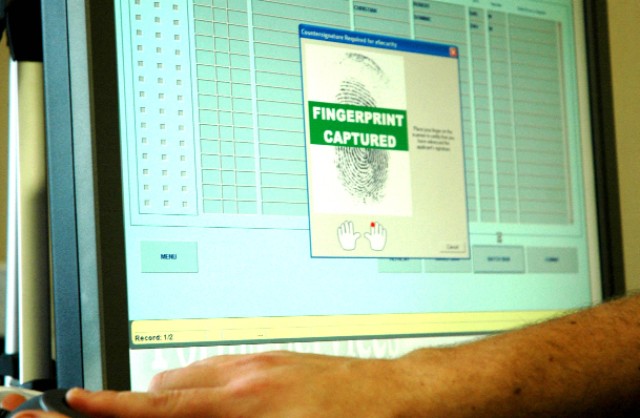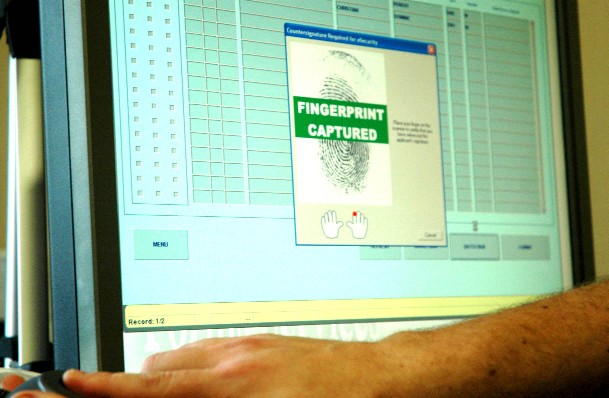
The e-Security system, newly implemented at the station, links all of an applicant... VIEW ORIGINAL
FORT MCPHERSON, Ga. -- One of the first experiences people have with the military is "hurry up and wait." Thanks to a new device being implemented at Military Entrance Processing Stations, that wait time isn't nearly as long.
The e-Security system is a biometric-based system that is replacing ink and paper signatures with a fingerprint, said Capt. Richard Laca, operations officer for the U.S. Atlanta MEPS at Fort Gillem.
Although Laca said it is a relatively new system, having only been field tested in Baltimore last year, and still being installed in MEPS in the eastern part of the country (the western part is fully implemented), the system has been well received by the MEPS staff.
"It's a more efficient system," said Edward Marsh, human resource technician at the Atlanta MEPS. "People leave (a station) in a couple seconds."
The Atlanta MEPS received their system two weeks ago.
The time cut down isn't the only reduction the system is creating. With everything transferring to a digital medium, it reduces the amount of paper records needed to be maintained.
"It's more efficient; data is kept better and you don't lose as much as with paper," said Lawrence Cruz, lead human resources technician at the Atlanta MEPS. "Everything is kept on a database."
Accessing that database only requires a fingerprint which, once provided, brings up access to all of a person's information, Cruz said.
Because all of the information is linked to a person's fingerprint, the e-Security system also helps cut down on ringers, Cruz said. Ringers are people who go through the application process for someone else, taking their Armed Service Vocational Aptitude Battery test or physical test.
Cruz, who has been working in the human resource field at the Atlanta MEPS, said as workers get more adept at the system, wait time will be cut even more. Familiarization with the transfer from ink and paper to digital with the e-Security system will also help make other new transitions in the future easier. Cruz said new paper military orders will eventually be replaced by e-orders, orders cut electronically that will be accessed through the e-Security system.
The move to electronics is part of the United States Military Entrance Processing Command strategic plan to provide superior service for all applicants processing for enlistment into the Armed Services, according to USMEPCOM strategic Plan 2010 through 2025.
"It's a new type of signature," Laca said. "It helps us properly capture a fingerprint, photo and validates an ID. It's a security check."

Social Sharing